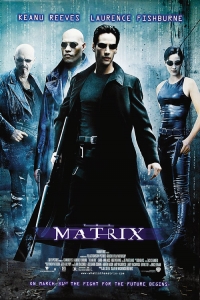
Coate: Where do you think The Matrix ranks among the Wachowskis’ body of work?
Hasan: It’s a singular achievement, entirely unmatched. While the siblings may have produced films that were more introspective (Cloud Atlas), personal (Bound), or even visually stunning (Speed Racer) during their careers, nothing has ever commanded the cultural conversation (in both good ways and bad) the way The Matrix (however briefly) did, and I highly doubt anything they produce again ever will.
Kapell: Other than their earlier film, Bound, it is their best work. They become quite self-indulgent afterwards, and that is too bad. But for this moment they made what is a nearly perfect film.
Mendelson: I’ve been a Speed Racer junkie since May of 2008, so offhand, I’d put The Matrix below Speed Racer and Matrix Reloaded and above Matrix Revolutions, Cloud Atlas and Jupiter Ascending.

Coate: Can you discuss the sequels, comics, video games, etc. and how they compare to the original film?
Hasan: I love them. All of them. For me it’s impossible to view The Matrix as simply one film. The story the Wachowskis were determined to tell can only be divined by viewing en toto not merely the subsequent cinematic chapters, but also the supplemental material that was made available through the Animatrix short films, video game cut scenes, and comics and short stories. Far from being licensed ephemera to be ignored, these additional works encompassed within them the multitudes that allowed for a greater understanding of how it was all meant to be deciphered. As they’d said all along, The Matrix was something that needed to be experienced, and these were all crucial parts of that experience.
Kapell: The reason The Matrix isn’t mentioned in the same breath as, say, Star Trek or Star Wars or the MCU is simple: Nothing in the rest of their franchise really works well. There are certain moments that are lovely, but there’s also a lot that is simply bad storytelling. It’s too bad because I think there’s a rich tapestry there to work with.
Mendelson: Aside from [my earlier] thoughts, the Matrix trilogy had the courage to end not with the enemy being outright destroyed, but by the key heroes sacrificing themselves for a brokered peace. Considering we were in the middle of the Iraq invasion/occupation, that was certainly a less crowd-pleasing finale versus Lord of the Rings’ “Hey, Frodo threw the ring into the mountain and now all the bad guys just evaporated” climax. I think a lot of folks only pretended to like The Matrix for its politics and its philosophy, when they really wanted more heroic fantasy and kung-fu action. So when the sequels tripled-down on the subtext and politics, audiences rebelled. Again, it didn’t help that many of the new characters, presented as the leaders of the resistance, were people of color. Say what you will about that rave sequence in Matrix Reloaded, but I don’t think anyone would have complained if it had been mostly white people sweatily dancing while Neo and Trinity had (gasp!) sex.
Coate: What is the legacy of The Matrix?
Hasan: Twenty years later, so much of the cinematic language The Matrix pioneered has been absorbed into the popular bloodstream that it becomes harder to appreciate the movie for its many achievements that were revolutionary at the time. Bullet time. Hong Kong action. Mind-bending philosophical questions unpacking the very nature of identity. It was darn near unprecedented at the time (and still is!) for a movie to cast its reach in so many different directions and succeed on almost every front. I don’t know that subsequent audiences whose knowledge of film was shaped in its aftermath will ever know what it was like to be part of the Matrix generation, but I’m sure glad that I got to be.
Kapell: It both captures the zeitgeist and it also provides a bridge from earlier film styles and later ones. So it is wholly of its moment and it is also, wholly a transitional film between periods.
Mendelson: It was an announcement picture, alongside The Phantom Menace, signaling that special effects were on the cusp of essentially bringing any concept or image to life. It was a prototypical hero’s journey flick and, despite its originality, very much struck the formula for the next phase of comic book superhero movies. Yes, folks complained about the sequels, but the original is still a pretty much universally regarded classic, as much of a cinematic touchtone as Star Wars (which arrived 22 years prior) precisely because it wasn’t trying to approximate an existing franchise. Yes, it homaged and referenced, but it made a point to look, sound and feel entirely new (especially for general moviegoers). It may not be my favorite Matrix (Reloaded > Matrix > Revolutions) or my favorite “the world you’re living in is a ghoulish illusion” flick (Dark City), but it’s still a remarkably confident, endlessly compelling and impeccably crafted sci-fi fantasy that feels almost as fresh today as it did 20 years ago.
Coate: Thank you — Zaki, Matthew, and Scott — for sharing your thoughts about The Matrix on the occasion of its 20th anniversary.

IMAGES
Selected images copyright/courtesy Groucho II Film Partnership, Silver Pictures, Village Roadshow Pictures, Warner Bros. Pictures, Warner Home Video.
SPECIAL THANKS
Victor Liorentas and Cliff Stephenson
- Michael Coate
Michael Coate can be reached via e-mail through this link. (You can also follow Michael on social media at these links: Twitter and Facebook)





